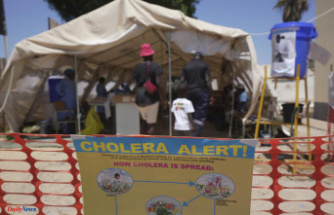The last four years have been the hottest recorded to date, according to has confirmed the Organization Meteorólica WMO (World), in the lobby of the conference of climate change (COP24) which is held in Poland from this weekend. The report State of the Global Climate 2108 confirms that the current year will be the fourth warmest, with temperatures of 0.98 degrees above the pre-industrial era.
The 20 hottest years have been recorded since 1996. The WMO warns that global temperature can rise three to five degrees with the trend of current from here to the end of the century, well above the "red line" of the two degrees defined by the Paris agreement (and the commitment to pursue efforts to limit the rise to 1.5 degrees).
The emissions of greenhouse gases have reached a new record, after the "stabilization" experienced in the past four years. The WMO estimates that the world must triple its efforts to not exceed the "limit" of two degrees, and multiply it by five to not exceed the line of safety of 1.5 degrees.
"we're Not or much less on the way to achieving the objectives for climate change", warned the secretary-general of WMO, Petteri Taalas. "If we exploit all the resources of fossil fuels, temperatures will rise considerably above".
Cyclones and heat waves"We are the first generation that understands the scope of climate change and the last generation that will be able to do something to alleviate the effects," he warned meteorologist Finnish, in a renewed call to action to political leaders.
According to the latest report from the WMO, the weather phenomenon known as La Niña, which contributes to a decrease of the temperatures on the surface of the sea, has mitigated to some extent the global warming in 2018. In 2019, however, there is an 80% chance of a reoccurrence of the counterpoint, known as The Child, with an increase of the temperatures in the Pacific Ocean that tends to cause heat waves in Australia, floods in South america and droughts in Asia and Africa.
The rising temperatures have triggered the episodes of extreme weather in the last year, with 70 tropical cyclones (compared to the average of 53), which have been affected, mostly to Vietnam, Korea and the Philippines and hurricanes in the Caribbean and on north american coasts. The waves of heat struck the centre and the north of Europe, with devastating fires in Greece, Sweden, Canada and California. The floods intensified in regions such as east Africa and Japan and forced the displacement of up to 1.4 million people in Kerala (India).
"Every fraction of a degree means a big difference to human health and to the access to food and drinking water", warns in remarks at The Guardina, the deputy secretary general of the WMO, Elena Manaenkova. "We are also talking about the extinction of animals and of the disappearance of the coral reefs and marine life".
The report State of the Global Climate 2018 also warns about the effects of the disappearance of the ice in the Arctic reached the third lowest historical level in march and the sixth lowest level in September. The WMO abvierte that the seas are absorbing a record amount of heat, and the process of ocean acidification is escalating.
According to the criteria of
Learn more Date Of Update: 12 December 2018, 08:00











